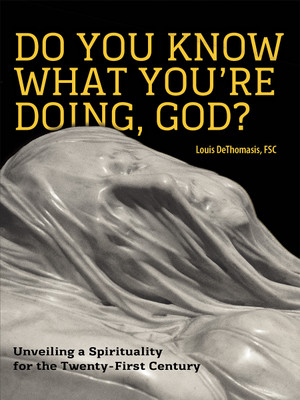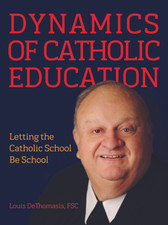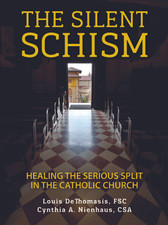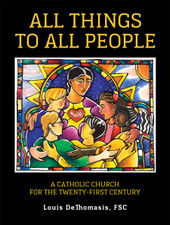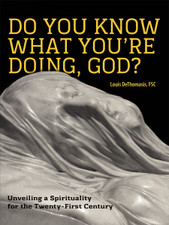Brother Louis is at it again: challenging the very nature of belief in the modern world and how human beings can practice an authentic spirituality in the twenty-first century. His newest book is aimed specifically at Roman Catholics, but it will be read by seekers of all Christian denominations, all faiths, and all those searching for a faith that makes sense to them today.
EXCERPT FROM DO YOU KNOW WHAT YOU’RE DOING, GOD?
In our own perplexing attempts to peer beneath the veil of theological convention, we may discover there is a higher truth in questions that can’t be answered than in answers that can’t be questioned. Jesus, the great communicator, used the things with which his disciples had everyday familiarity to convey his message of salvation and the power of universal love: the lilies of the field, wheat and chaff, a mustard seed, lost sheep, fig trees, the power of Caesar, toiling in the fields, the nets of the fishermen. But is that how he would choose to speak to us today, in the third millennium since his death? Would he not speak instead of quarks and Wall Street capitalism, organ transplants, nuclear arsenals, gender identity, our failing stewardship of the planet, racial animus, income disparity, and unwelcome refugees? Who, we may ask, are the outcasts of our society today with whom he would seek communion? What contemporary hypocrites would suffer his scorn? Whom would he drive from the temple today? These are questions that have the power to engage and awaken us.
132 pages, paperback, $14.95, 978-0-87946-979-5, #2025
BROTHER LOUIS DE THOMASIS, FSC, a member of the De La Salle Christian Brothers, is President Emeritus of Saint Mary’s University of Minnesota and Chairman of Christian Brothers Investment Services–Global. He is the author of Flying in the Face of Tradition, Dynamics of Catholic Education, All Things to All People, and co-author, with Cynthia Nienhaus, CSA, of The Silent Schism: Healing the Serious Split in the Catholic Church.
DO YOU KNOW WHAT YOU ARE DOING, GOD?
Unveiling a Spirituality for the Twenty-First Century
Louis DeThomasis, FSC.
A REVIEW by Fran Salone-Pelletier
"In this book, Louis DeThomasis consistently exemplifies his thesis. We, God’s people—all of us—have been gifted with the ability and opportunities to ask questions. This is both a frighteningly challenging grace and a fearsomely exhilarating one. Sadly, it is too often either denied or dismissed in the face of rigidly understood truth devoid of mystery.
DeThomasis both encapsulates and expands a dilemma the Hebrew prophet Jeremiah proffers. “You are right, O God and you set things right. I can’t argue with that. But, I do have some questions.” [Jeremiah 12:1-2, The Message] Jeremiah had to ask. DeThomasis has to ask. He pleads the case for our questioning, as well. It is the heart of our quest for the God-who-is and yet remains ready to be revealed.
To question God, for many, may seem to be an act of treason or a display of faithlessness—an ungodly deed. Yet, in the questioning we find and have our response—even if it is unquestionably inscrutable!
In the introduction, DeThomasis clarifies both his stance and his approach as an assimilation of theological thought—not a dogmatic presentation. Interestingly, he follows his dictum regarding queries into truth with a refreshing plea: “Please read this book with pen in hand. Question it; argue with it; explore with it; then ask God your own questions.”
With pithy titles for each chapter followed by illustrative quotes, DeThomasis lures the reader into his web of mystery and possibility. Once entered, the glue of repetition is provided as quandary deepens and broadens our wisdom. His belief that “questions, not answers, deepen faith” is freeing for those who have been carefully instructed to “pray, pay, and obey”—without questioning either cause or effect.
Lest the reader perceive his grasp of reality to be a purely personal and individual one, DeThomasis offers multiple references from a variety of sources to substantiate his claim without desiring to concretize it. Additionally, he clarifies the distinctions between religion, spirituality, and faith—words often bandied about devoid of adequate definition or description.
If one needs a ‘bottom-line’ to this short but profound work, it might well be discovered in the title of Chapter 5 “Get An Eye Transplant.” The discovery is noted in a recipe with seven ingredients. With new eyes and clearer insight, there will be:
1/ readiness to see the deliciousness of ambiguity
2/ the integrity of one-ness
3/ a true and radical acceptance of a divinely human sexuality
4/ recognition of the need to integrate ancient ideas in a living spirituality for today.
5/deeper recognition of the ways in which spirituality is sabotaged by the discrimination against women
6/awareness that unity and universality do not mean uniformity.
7/a unique freedom to: “believe what we choose to believe and know we are answerable for what we choose to believe.”
As I continued my reading, another question was evoked. “Do we know what we are doing to God?” Lo and behold, Louis DeThomasis incorporated the very idea in his conclusion: “Building a World in Which God Would Be Happy to Live”. There is our human challenge, divinely offered, spiritually presented, graphically displayed.
It’s an offer we can’t refuse without suffering grave consequences. Read the book, weep…and then live the invitation."
Fran Salone-Pelletier M.A. Theology
Author: Awakening to God: The Sunday Readings In Our Lives, Years A, B, C
 Loading... Please wait...
Loading... Please wait...

